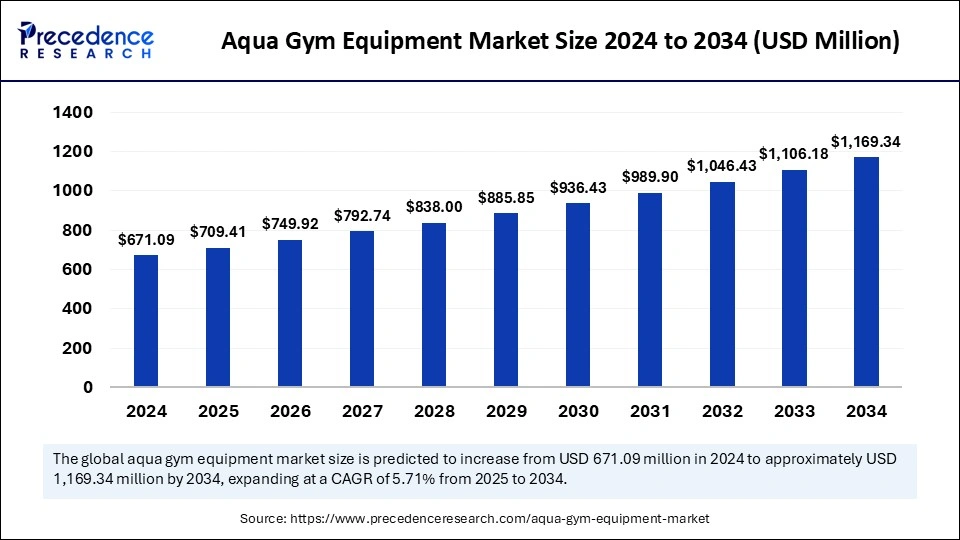The global aqua gym equipment market size was estimated at USD 671.09 million in 2024 and is expected to cross around USD 1,169.34 million by 2034, growing at a CAGR of 5.71% from 2025 to 2034.

Get Sample Copy of Report@ https://www.precedenceresearch.com/sample/5719
Key Insights
-
In 2024, North America held the leading market share, accounting for 41% of total revenue.
-
Europe is forecasted to grow at a strong CAGR of 27.31% throughout the projected period.
-
The cardiovascular aqua gym equipment segment captured the highest market share of 60% in 2024.
-
The strength training aqua gym equipment market is set to grow at a CAGR of 6.91% in the coming years.
-
The specialty stores segment remained the dominant distribution channel, contributing 49% of total sales in 2024.
-
Online stores are expected to record the fastest growth, with a CAGR of 7.5% over the forecast period.
Impact of AI on the Aqua Gym Equipment Market
-
Increased Adoption of Smart Fitness Solutions
AI integration has led to a growing demand for smart aqua gym equipment, attracting both individual consumers and commercial fitness centers seeking high-tech workout solutions. -
Enhanced User Experience and Engagement
AI-powered personalized training and interactive features make aqua workouts more engaging, encouraging more people to adopt water-based fitness routines. -
Improved Equipment Efficiency and Reduced Costs
Predictive maintenance powered by AI reduces repair costs and enhances the lifespan of aqua gym equipment, leading to cost savings for businesses and gym owners. -
Growth in the Premium Fitness Segment
High-end fitness centers and luxury spas are investing in AI-enabled aqua gym equipment, driving market growth in the premium fitness sector. -
Data-Driven Innovations and Product Development
AI analytics provide manufacturers with insights into user behavior, leading to the development of new, advanced aqua fitness products tailored to consumer preferences. -
Market Expansion and Increased Accessibility
AI-powered virtual coaching and online training programs make aqua gym workouts accessible to a wider audience, expanding market reach beyond traditional fitness centers.
Also Read: Spa Services Market
Market Scope
| Report Coverage | Details |
| Market Size by 2034 | USD 1,169.34 Million |
| Market Size in 2025 | USD 709.41 Million |
| Market Size in 2024 | USD 671.09 Million |
| Market Growth Rate from 2025 to 2034 | CAGR of 5.71% |
| Dominated Region | North America |
| Fastest Growing Market | Europe |
| Base Year | 2024 |
| Forecast Period | 2025 to 2034 |
| Segments Covered | Product, Distribution Channel, and Regions. |
| Regions Covered | North America, Europe, Asia-Pacific, Latin America and Middle East & Africa |
Market Dynamics
Market Drivers
The shift towards holistic and low-impact workout solutions is a major driver of the aqua gym equipment market. As people seek alternative fitness methods that are gentle on joints yet effective for strength building, the demand for water-based workouts is increasing.
The aging population, particularly in developed countries, is also contributing to market growth, as seniors often prefer aqua fitness due to its therapeutic benefits. Additionally, rising investments in sports rehabilitation and physiotherapy clinics are boosting the adoption of specialized aqua gym equipment.
Market Opportunities
There is significant potential for innovation in the aqua gym equipment market, especially with the integration of AI and smart fitness tracking. Wearable technology that syncs with aqua fitness machines can enhance user engagement and performance monitoring. The growing emphasis on corporate wellness programs also presents opportunities, as companies invest in fitness solutions for employees, including aquatic exercise programs.
Additionally, the increasing trend of luxury home fitness setups is creating demand for high-end, compact aqua gym equipment designed for personal use.
Market Challenges
One of the key challenges facing the aqua gym equipment market is the need for specialized infrastructure, including pools and designated aquatic training areas. Many fitness centers lack the necessary facilities, limiting market growth. Additionally, the cost of maintenance and water treatment adds to operational expenses, deterring small and mid-sized gyms from investing in aqua fitness solutions.
Another challenge is consumer skepticism regarding the effectiveness of aqua workouts compared to traditional gym routines, requiring greater awareness and education efforts.
